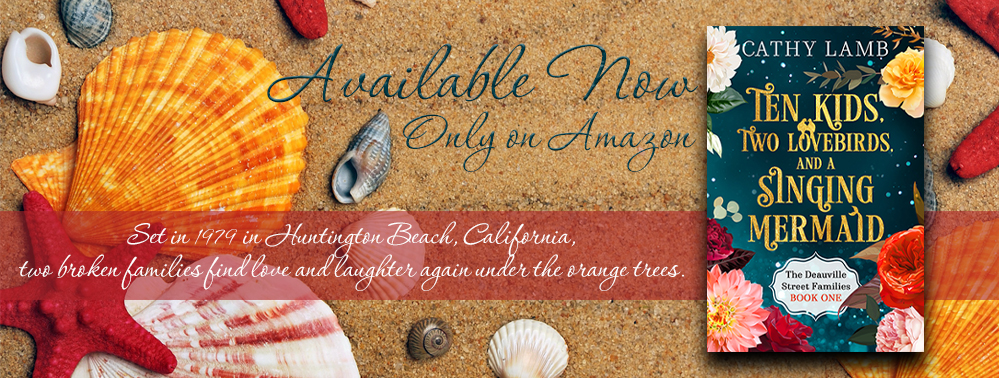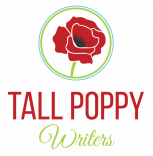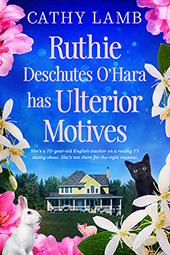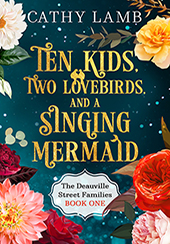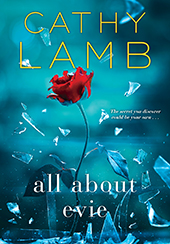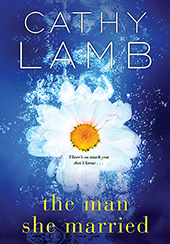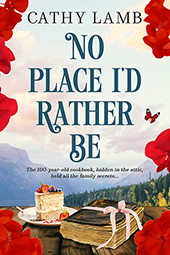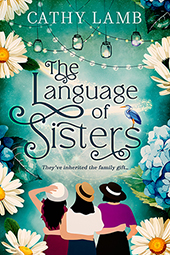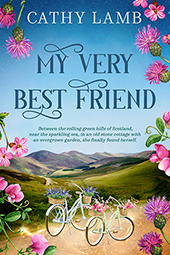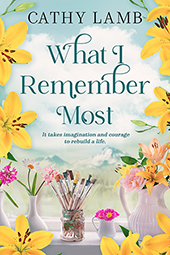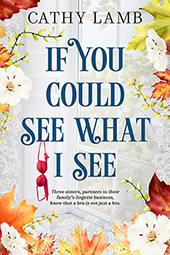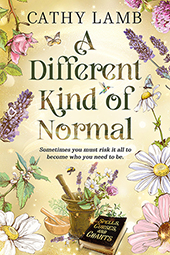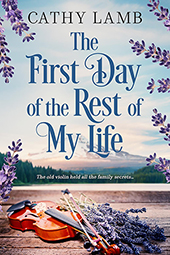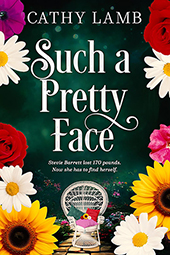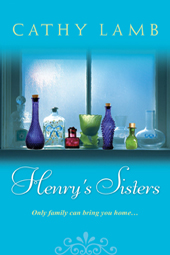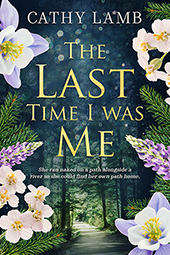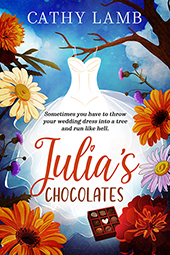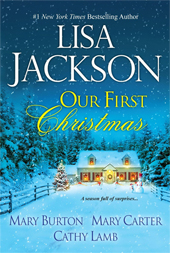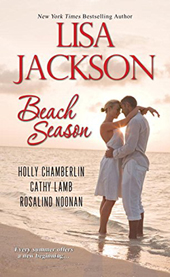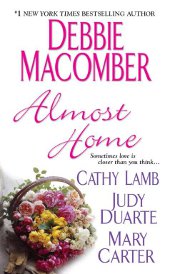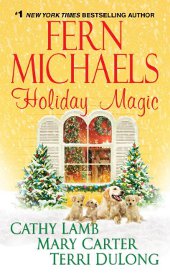Thanks, USA Today!
Happily Ever After of USA Today shares an excerpt from The Language of Sisters by Cathy Lamb (no relation!) The Language of Sisters arrives tomorrow (Tuesday).
by Joyce Lamb
original link: http://happyeverafter.usatoday.com/2016/08/29/language-of-sisters-excerpt-cathy-lamb/
 About the book:
About the book:
Toni Kozlovsky can’t explain how she knows exactly what her sisters are feeling—only that the connection seems to happen out of the blue, just when they need it most. Since Toni, Valerie, and Ellie were little girls growing up in Communist Russia, their parents have insisted it’s simply further proof that the Kozlovskys are special and different.
Now a crime and justice reporter, Toni lives on a yellow tugboat on Oregon’s Willamette River. As far as her parents are concerned, the pain of their old life and their dangerous escape should remain buried in the Moscow they left behind, as should the mysterious past of their adopted brother, Dmitry. But lately, Toni’s talent for putting on a smile isn’t enough to keep memories at bay.
Valerie, a prosecuting attorney, wages constant war against the wrongs she could do nothing about as a child. Youngest sister Ellie is engaged to marry an Italian, breaking her mother’s heart in the process. Toni fears she’s about to lose her home, while the hard edged DEA agent down the dock keeps trying to break through her reserve. Meanwhile, beneath the culture clashes and endearing quirks within her huge, noisy, loving family are deeper secrets that Toni has sworn to keep—even from the one person she longs to help most.
Chapter 1
I was talented at pickpocketing.
I knew how to slip my fingers in, soft and smooth, like moving silk. I was lightning quick, a sleight of hand, a twist of the wrist. I was adept at disappearing, at hiding, at waiting, until it was safe to run, to escape.
I was a whisper, drifting smoke, a breeze.
I was a little girl, in the frigid cold of Moscow, under the looming shadow of the Soviet Union, my coat too small, my shoes too tight, my stomach an empty shell.
I was desperate. We were desperate.
Survival stealing, my sisters and I called it.
Had we not stolen, we might not have survived.
But we did. We survived. My father barely, my mother only through endless grit and determination, but now we are here, in Oregon, a noisy family, who does not talk about what happened back in Russia, twenty-five years ago. It is best to forget, my parents have told us, many times.
“Forget it happened. It another life, no?” my father says. “This here, this our true life. We Americans now. Americans!”
We tried to forget, but in the inky-black silence of night, when Mother Russia intrudes our dreams, like a swishing scythe, a crooked claw emerging from the ruins of tragedy, when we remember family members buried under the frozen wasteland of the Soviet Union’s far reaches, we are all haunted, some more than others.
You would never guess by looking at my family what some of us have done and what has been done to us. You would never sense our collective memory, what we share, what we hide.
We are the Kozlovskys.
We like to think we are good people.
And, most of the time, we are. Quite good.
And yet, when cornered, when one of us is threatened, we come up swinging.
But, pfft.
All that. In the past. Best to forget what happened.
As my mother says, in her broken English, wagging her finger, “No use going to Moscow in your head. We are family. We are the Kozlovskys. That all we need to know. The rest, those secrets, let them lie down.”
Yes, do.
Let all the secrets lie.
For as long as they’ll stay down.
They were coming up fast. I could feel it.
Chapter 2
“A Italian!” my mother, Svetlana, howled, slamming a cast iron pan to her stove. “What is this? My Elvira marrying a Italian? Why not a Russian? What wrong with Russian? I been cursed. Like black magic spell.”
English is my mother’s fourth language. Russian and Ukrainian come first. She is also conversationally fluent in French, which is the language she likes to swear in. Her English is never perfect, but it goes downhill quickly based on how upset she is.
“That sister of yours, Antonia,” – she put her palms up to the ceiling – “Elvira is a…how you say it? I know now the word: rebel. She a rebel. I pray for her, but I knew when she born, your aunt Polina say to me, ‘This one, she will cause your heart to cry!’ And see?” She pointed at her chest. “Tears.”
“Mama. Your heart is not crying. Ellie says she is in love with Gino.”
“Love! Love!” she scoffed. She pushed a strand of her black hair back, the same color as mine, only mine fell down my back in waves and hers was to her shoulders in a bell shape. Our blue eyes were the same shade, too. I looked at her and I knew what I’d look like in twenty-two years. Definitely encouraging.
“I know about love. I have it with your papa. I know about this passion I have for him. He and I, we have the, what you call it?” She lowered her voice, for effect. “The biology in the bedroom.”
“Chemistry. You and Papa have chemistry.” I rolled my eyes and braced myself, then ate one of her chocolate fudge cookies. They are beyond delicious.
“No! Not chemistry. That chemicals. I say we have the biology in the bedroom because biology is body. He cannot stay away from me, from this.” She indicated her body from neck to crotch with one hand, head held high. My mother is statuesque. She curves. She still rocks it, I have to say.
“I cannot stay away from his manly hood, either. I say that in the truth.”
I was going to need many chocolate fudge cookies that afternoon, that was my truth.
“But Antonia, your sister”—her voice pitched again, in accusation, as if I were in charge of Elvira—“she cannot have the biology for a Italian. She has it, it in her blood, for a Russian! A strong Russian man.”
My mother started banging pans around, muttering in Ukrainian. I loved her kitchen. It was huge, bright, and opened up to the family room. There were granite counters, white cabinets, and a backsplash with square tiles in every bold color of the rainbow. My mother loves bright colors. Says it reminds her, “I am no longer living in a gray and black world, fear clogging my throat like a snake.”
She had her favorite blue armoire, used by an old bakery to showcase their pies, built into the design and used it as a pantry. A butcher block counter was attached to a long, old wood table that had previously been used in a train station. Blue pendant lights, three of them, fell above the train station table. The windows were huge, at my mother’s request. She wanted to be able to look out and know immediately that she was in America, not Moscow. “Free,” she said. “And safe.”
This kitchen was where all of her new recipes for my parents’ restaurant, Svetlana’s Kitchen, were tried out. This kitchen was thousands of miles away from the tiny, often non-functioning kitchen of my childhood in Moscow. The one where I once watched her wash blood off her trembling hands—not her blood—in our stained and crumbling sink.
“Elvira should marry Russian man. She will grow to love him, like a sunflower grow. Like a turnip grow.”
“You were in love with Papa when you married him. No one asked you to grow to love your husband like a turnip.”
“Ah yes, that. I in love with your papa when I see him at university. I told my father after the first kissy, you must plan wedding for Alexeiand me right away, right now, because soon I lay naked with him.”
Oh boy. Here we go. I poured myself a cup of coffee. My mother makes coffee strong enough for me to grow chest hairs.
“I make the love with him.” She grabbed a spatula and pointed it at me. “I say that to my father.”
I imagined my mother’s sweet, late father, Anatoly Sabonis, hearing that from her. Poor man. I’m sure he momentarily stopped breathing. “I know, Mama, you told me.”
“It was how I felt. Here.” She put her spatula to her heart. “So in one month I am married to Alexei, but my father not let me be alone with him for one minute before wedding. And still, in the bedroom, your papa and I…”
“I know, Mama. You love Papa. Like Ellie loves Gino.”
“No! Not like that.” She smacked the spatula on the countertop. “Elvira fall in love with non Russian. A nonrusseman.”
“A nonrusseman?”
“Yes. I make that word up myself. It clever.”
“Is it one word?”
“Yes. One word. More efficient. More quickly.”
“Are you done?”
“No, I not done. Never done. That Italian not Russian. Does not have our genes. Our pants, you know? The jeans. Not have our history in his blood.”
“Mama, what’s in our blood is a lot of Russian vodka.”
“Yes, devil drink. Fixes and dixes so many Russians, but we are Russian American. American Russians. We marry other American Russians.”
“Unless we fall in love with Italian Americans, then we marry them. Or we marry Hawaiians, like Valerie did.”
“Kai is my new son.” She adores my sister’s husband. “Not this Gino. No and no. He not enough. I see them together and I no see the love.”
I didn’t see it, either. From Ellie to Gino, at least, but not the other way around. Gino loved Ellie. I decided to keep my mouth shut.
My mother whipped the spatula through the air like a lasso. “But she plans a wedding. Me oh my God bless, Mother Mary help me.”
“I like Italian food.”
“Italian food!” My mother gasped. “Italian food? At the wedding of my Elvira? No. Russian food. We have Russian food. If we not have Russian food, I not come.”
“Ellie wants you to come.”
She crossed her arms over her impressive bosom. “No. Not unless Russian food.”
“It will be Russian and Italian food, I heard. A blend.” I tried not to laugh and aggravate my mama
“That not happening.” Fists to air. She looked to the heavens for divine intervention. So dramatic. “It cannot be. I am good Russian mother. I be good to her and now! A Italian. My Elvira choices it. Where went I wrong?”
“Gino is not an it.”
I watched my mother in the kitchen as she yanked out more pans. Four of them. Her pans, cast iron, from my father, are her favorite possession. She cried when he brought them home many years ago, when I was a teenager, as did my father. It wasn’t about the pans. It was about loss, despair, and a promise kept.
My mother, Svetlana, loves to cook, and when she’s stressed she cooks until the stress is gone. The cooking and baking can last for days.


